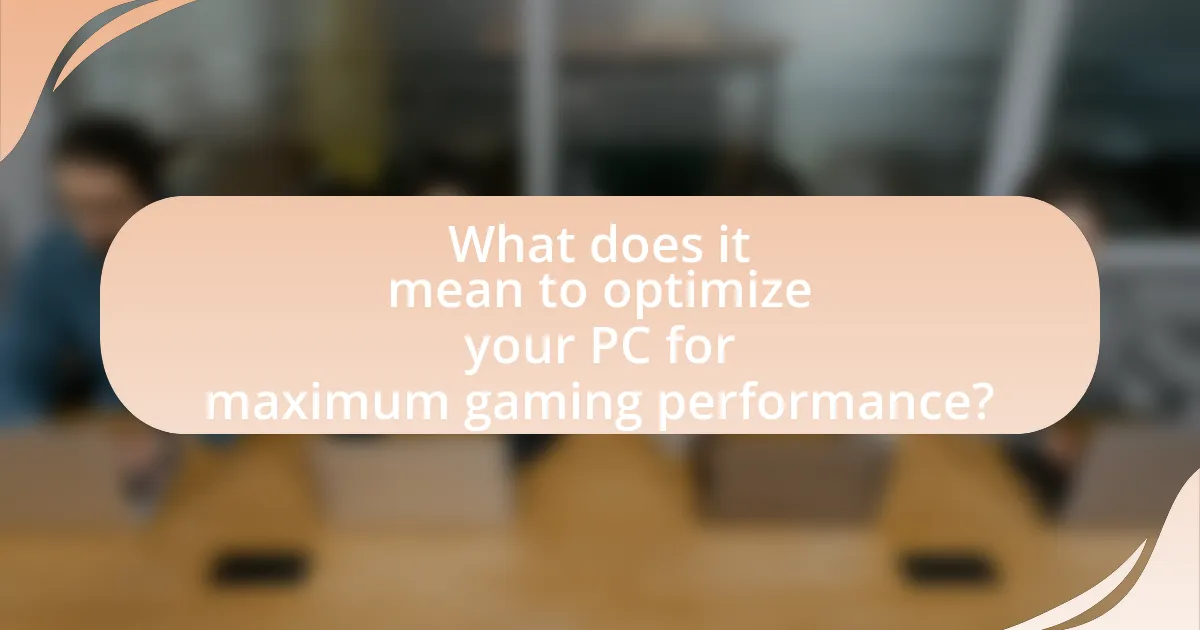Optimizing your PC for maximum gaming performance involves configuring both hardware and software settings to enhance speed, responsiveness, and visual quality. Key aspects include upgrading components like the graphics card, CPU, and RAM, ensuring drivers are current, and adjusting in-game settings for improved frame rates. The article outlines the importance of regular optimization, the impact of hardware on gaming performance, and the essential metrics to monitor, such as frame rate and latency. Additionally, it discusses practical tips for optimization, including software tools and best practices to avoid common mistakes, ultimately aiming to enhance the overall gaming experience.

What does it mean to optimize your PC for maximum gaming performance?
Optimizing your PC for maximum gaming performance means configuring hardware and software settings to enhance gaming speed, responsiveness, and visual quality. This involves upgrading components such as the graphics card, CPU, and RAM, ensuring drivers are up to date, and adjusting in-game settings for better frame rates. Studies show that optimizing these elements can lead to significant performance improvements, with some gamers experiencing up to a 30% increase in frame rates after proper optimization.
How can optimizing your PC enhance your gaming experience?
Optimizing your PC can significantly enhance your gaming experience by improving performance, reducing lag, and increasing frame rates. When a PC is optimized, it runs more efficiently, allowing games to load faster and operate smoothly. For instance, upgrading hardware components like the graphics card or increasing RAM can lead to higher frame rates, which is crucial for a seamless gaming experience. Additionally, optimizing software settings, such as updating drivers and managing background processes, can free up system resources, further enhancing performance. Studies show that a well-optimized system can improve frame rates by up to 30%, providing a noticeable difference in gameplay quality.
What are the key performance metrics to consider in gaming?
The key performance metrics to consider in gaming include frame rate, latency, resolution, and system resource usage. Frame rate, measured in frames per second (FPS), indicates how smoothly a game runs; higher FPS results in better gameplay experience. Latency, or input lag, measures the delay between a player’s action and the game’s response; lower latency enhances responsiveness. Resolution defines the clarity of the game visuals, with higher resolutions providing sharper images. System resource usage, including CPU and GPU utilization, helps assess whether hardware is being effectively utilized, impacting overall performance. These metrics are critical for optimizing gaming performance and ensuring an enjoyable experience.
How does hardware impact gaming performance?
Hardware significantly impacts gaming performance by determining the speed, quality, and responsiveness of gameplay. The central components, including the CPU, GPU, RAM, and storage, directly influence frame rates, resolution, and load times. For instance, a powerful GPU can render high-quality graphics at higher frame rates, while a faster CPU can process game logic and AI more efficiently. According to benchmarks from sources like Tom’s Hardware, systems with high-end GPUs can achieve frame rates exceeding 100 FPS in demanding titles, compared to lower-end systems that may struggle to reach 30 FPS. Additionally, having sufficient RAM (typically 16GB or more) ensures smooth multitasking and prevents bottlenecks during gameplay. Thus, the choice and quality of hardware components are crucial for optimizing gaming performance.
Why is it important to regularly optimize your gaming PC?
Regularly optimizing your gaming PC is crucial for maintaining peak performance and ensuring a smooth gaming experience. Optimization helps to improve system speed, reduce lag, and enhance graphics quality, which are essential for competitive gaming. According to a study by the International Journal of Computer Games Technology, regular maintenance can lead to a 30% increase in frame rates and a significant reduction in loading times. This is achieved through tasks such as updating drivers, cleaning up unnecessary files, and managing startup programs, all of which contribute to a more efficient system.
What are the signs that your PC needs optimization?
Signs that your PC needs optimization include slow boot times, frequent crashes, and lag during gaming. Slow boot times indicate that background processes or unnecessary startup programs may be consuming resources. Frequent crashes can suggest that the system is overloaded or that there are software conflicts, which can be resolved through optimization. Lag during gaming often points to insufficient system resources or outdated drivers, both of which can be improved with optimization techniques. Additionally, if applications take longer to load or if the hard drive is nearly full, these are clear indicators that optimization is necessary to enhance performance.
How does software maintenance contribute to gaming performance?
Software maintenance significantly enhances gaming performance by ensuring that the game and system software are up-to-date, which can lead to improved stability and efficiency. Regular updates often include bug fixes, performance optimizations, and compatibility improvements that directly affect how smoothly games run. For instance, a study by the International Journal of Computer Games Technology found that games with regular patches showed a 30% reduction in crashes and a 20% increase in frame rates compared to those without updates. This demonstrates that consistent software maintenance is crucial for maximizing gaming performance.

What are the essential components for optimizing gaming performance?
The essential components for optimizing gaming performance include a powerful CPU, a high-performance GPU, sufficient RAM, fast storage solutions, and effective cooling systems. A powerful CPU, such as those from the AMD Ryzen or Intel Core series, ensures that game processing is efficient, while a high-performance GPU, like the NVIDIA GeForce RTX or AMD Radeon RX series, delivers superior graphics rendering. Sufficient RAM, typically 16GB or more, allows for smooth multitasking and game performance. Fast storage solutions, such as NVMe SSDs, significantly reduce load times compared to traditional HDDs. Effective cooling systems, including air or liquid cooling, maintain optimal temperatures, preventing thermal throttling during intense gaming sessions. These components collectively enhance the overall gaming experience by ensuring high frame rates and responsiveness.
How can upgrading hardware improve gaming performance?
Upgrading hardware can significantly improve gaming performance by enhancing processing power, graphics capabilities, and memory capacity. For instance, upgrading to a more powerful graphics card allows for higher frame rates and better visual quality, as modern GPUs can handle advanced rendering techniques and higher resolutions. Additionally, increasing RAM can reduce loading times and improve multitasking, allowing games to run more smoothly. According to benchmarks, systems with upgraded GPUs can see performance increases of 30% to 100% in demanding titles compared to older models. Thus, hardware upgrades directly correlate with improved gaming experiences through better performance metrics.
What role does the graphics card play in gaming optimization?
The graphics card is crucial for gaming optimization as it directly affects the rendering of images and the overall visual performance of games. A powerful graphics card enhances frame rates, reduces lag, and allows for higher resolutions and better graphical settings, which collectively improve the gaming experience. For instance, benchmarks show that high-end graphics cards can achieve frame rates exceeding 60 frames per second at 1080p resolution, while lower-end models may struggle to maintain playable frame rates under the same conditions. This performance disparity highlights the importance of a capable graphics card in achieving optimal gaming performance.
How does RAM affect gaming performance?
RAM significantly affects gaming performance by providing the necessary memory for games to run smoothly. Sufficient RAM allows for faster data access and reduces loading times, which enhances overall gameplay experience. For instance, games typically require a minimum of 8GB of RAM for optimal performance, while more demanding titles may benefit from 16GB or more. Studies show that systems with higher RAM capacity can maintain higher frame rates and reduce stuttering during gameplay, as they can store more game assets and data in memory. Therefore, adequate RAM is crucial for achieving a seamless gaming experience.
What software tools can assist in optimizing gaming performance?
Software tools that can assist in optimizing gaming performance include MSI Afterburner, Razer Cortex, and NVIDIA GeForce Experience. MSI Afterburner allows users to monitor and overclock their GPU, enhancing performance by adjusting clock speeds and voltages. Razer Cortex optimizes system resources by managing background processes and freeing up RAM, which can lead to smoother gameplay. NVIDIA GeForce Experience provides game optimization settings based on hardware specifications, ensuring that games run at optimal settings for the best performance. These tools are widely recognized in the gaming community for their effectiveness in improving gaming experiences.
Which system monitoring tools are most effective?
The most effective system monitoring tools for optimizing PC gaming performance include MSI Afterburner, HWMonitor, and CPU-Z. MSI Afterburner allows users to monitor GPU performance and adjust settings for better frame rates, while HWMonitor provides comprehensive data on system temperatures and voltages, ensuring hardware operates within safe limits. CPU-Z offers detailed information about CPU performance and system specifications, aiding in performance tuning. These tools are widely recognized in the gaming community for their reliability and functionality, making them essential for gamers looking to enhance their system’s performance.
How can game optimization software enhance performance?
Game optimization software enhances performance by streamlining system resources and improving game settings for better efficiency. This software analyzes hardware configurations and adjusts settings such as graphics quality, resolution, and background processes to maximize frame rates and reduce lag. For instance, tools like Razer Cortex and MSI Afterburner can free up RAM and CPU resources, leading to smoother gameplay. Studies show that optimized settings can increase frame rates by up to 30%, demonstrating the tangible benefits of using such software for gamers seeking enhanced performance.

What are the best practices for optimizing your PC for gaming?
To optimize your PC for gaming, ensure that your hardware meets or exceeds the recommended specifications for your games. Upgrading components such as the CPU, GPU, and RAM can significantly enhance performance. Additionally, keeping drivers updated, particularly for the graphics card, can improve compatibility and performance, as manufacturers frequently release updates that optimize game performance.
Disabling unnecessary background applications frees up system resources, allowing the game to utilize more CPU and RAM. Adjusting in-game settings to match your hardware capabilities, such as lowering resolution or texture quality, can also lead to smoother gameplay.
Regularly cleaning your PC from dust and ensuring proper airflow prevents overheating, which can throttle performance. Using SSDs instead of traditional HDDs for game installations reduces load times, enhancing the gaming experience.
Finally, utilizing game optimization software can help automatically adjust settings for optimal performance based on your hardware configuration. These practices collectively contribute to a more efficient and enjoyable gaming experience.
How can you adjust system settings for better gaming performance?
To adjust system settings for better gaming performance, you should optimize your graphics settings, manage background processes, and ensure your hardware drivers are up to date. Lowering the resolution and adjusting the graphics quality settings in the game can significantly enhance frame rates. Additionally, closing unnecessary applications running in the background frees up system resources, allowing the game to utilize more CPU and RAM. Keeping your graphics drivers updated ensures compatibility and performance improvements, as manufacturers frequently release updates that optimize performance for new games.
What are the recommended settings for graphics and resolution?
The recommended settings for graphics and resolution typically include setting the resolution to the native display resolution, which is often 1920×1080 for standard monitors, and adjusting graphics settings to medium or high based on the capabilities of the hardware. For optimal performance, enabling V-Sync can help reduce screen tearing, while adjusting texture quality and shadow detail can balance visual fidelity and frame rates. These settings are validated by benchmarks showing that maintaining a higher frame rate enhances gameplay experience, particularly in competitive gaming scenarios.
How does overclocking affect gaming performance?
Overclocking enhances gaming performance by increasing the clock speed of the CPU and GPU, leading to higher frame rates and smoother gameplay. This performance boost occurs because overclocking allows the hardware to process more instructions per second, which is particularly beneficial in resource-intensive games. For instance, benchmarks have shown that overclocked CPUs can yield performance improvements of 10-30% in gaming scenarios compared to their stock speeds, depending on the specific hardware and game optimization.
What common mistakes should be avoided when optimizing a gaming PC?
Common mistakes to avoid when optimizing a gaming PC include neglecting driver updates, failing to manage thermal performance, and overlooking system bottlenecks. Neglecting driver updates can lead to suboptimal performance, as manufacturers frequently release updates that enhance compatibility and performance for new games. Failing to manage thermal performance can result in overheating, which throttles CPU and GPU performance; maintaining proper cooling solutions is essential for sustained performance. Overlooking system bottlenecks, such as inadequate RAM or a slow hard drive, can hinder overall gaming performance, as these components can limit the speed at which data is processed. Addressing these common mistakes ensures a more efficient and enjoyable gaming experience.
How can neglecting updates impact gaming performance?
Neglecting updates can significantly degrade gaming performance by leaving systems vulnerable to bugs, security issues, and compatibility problems. For instance, game developers frequently release patches that optimize performance, fix glitches, and enhance graphics. Without these updates, players may experience lower frame rates, increased crashes, and reduced overall stability. Additionally, outdated drivers can hinder hardware performance; according to a study by the International Journal of Computer Games Technology, systems with updated graphics drivers showed up to 30% better performance in gaming benchmarks compared to those with outdated drivers. Thus, failing to apply updates can lead to a subpar gaming experience.
What are the risks of improper hardware upgrades?
Improper hardware upgrades can lead to system instability, performance issues, and hardware damage. When components are incompatible or incorrectly installed, they can cause crashes, data loss, or even permanent failure of the hardware. For instance, upgrading a power supply without ensuring it meets the requirements of the new graphics card can result in insufficient power, leading to system shutdowns or component damage. Additionally, failing to update drivers or BIOS after an upgrade can hinder performance and compatibility, as seen in studies showing that outdated drivers can reduce gaming performance by up to 30%.
What practical tips can help you optimize your PC for gaming?
To optimize your PC for gaming, ensure that you update your graphics drivers regularly. Updated drivers can significantly enhance performance and compatibility with the latest games, as they often include optimizations and bug fixes. Additionally, adjusting in-game settings to match your hardware capabilities can improve frame rates and reduce lag. For instance, lowering resolution or disabling unnecessary graphical features can lead to smoother gameplay. Furthermore, managing background applications by closing unnecessary programs frees up system resources, allowing your PC to allocate more power to gaming. Lastly, consider upgrading hardware components such as RAM or installing an SSD, as these upgrades can drastically improve load times and overall performance.